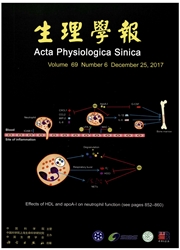

 中文摘要:
中文摘要:
学习记忆障碍是应激后最严重的问题之一,其确切的机制有待阐明。内源性阿片系统对包括学习记忆在内的多种生理功能具有重要调控作用,而该系统是否参与应激后学习记忆功能的损伤尚未明确。本研究旨在探讨阿片μ受体在应激诱发的学习记忆障碍中的作用。以昆明小鼠为研究对象,进行连续4天的Morris水迷宫训练,每天水迷宫训练前高台应激30min,并在侧脑室注射生理盐水、阿片μ受体特异性激动剂DAMGO或阿片μ受体特异性拮抗剂CTAP,第五天测试小鼠空间参考记忆能力。结果显示,水迷宫训练前激活μ受体可损伤小鼠空间参考记忆能力,而阻断μ受体对小鼠空间参考记忆能力没有影响;训练前进行30min的高台应激处理可以损伤小鼠空间参考记忆提取能力;在高台应激后立即向侧脑室注射“受体激动剂DAMGO可以加重小鼠空间学习记忆能力的损伤,但注射儿受体阻断剂CTAP可以翻转高台应激对小鼠空间参考记忆能力的损伤效应。以上结果提示,应激状态下,内源性阿片μ受体系统参与调控小鼠空间参考记忆能力的损伤效应。
 英文摘要:
英文摘要:
Learning/memory impairment is one of the most serious problems induced by stress, and the underlying mechanisms remain unclear. Opiates and opioid receptors are implicated in multiple physiological functions including learning and memory. How- ever, there is no clear evidence whether the endogenous opioid system is involved in the formation of the stress-induced spatial reference memory impairment. The aim of the present study was to evaluate the role of μ opioid receptor in the stress-induced spatial reference memory impairment by means of Morris water maze (MWM) test in a mouse elevated platform stress model. The mice were trained in the MWM for four trials a session for 4 consecutive days after receiving the elevated platform stress, and intracerebro-ventricular injection of μ opioid receptor agonist DAMGO, antagonist CTAP or saline. Retention of the spatial training was assessed 24 h after the last training session with a 60-s free-swim probe trial using a new starting position. The results showed that intracere- broventricular injection of μ opioid receptor agonist DAMGO but not antagonist CTAP before MWM training impaired the memory retrieval of mice. Elevated platform stress before MWM training also impaired memory retrieval, which could be reversed by pre-injection of CTAP, and aggravated by DAMGO. These results suggest that endogenous opioid system may play a crucial role in the formation of the stress-induced memory impairment.
 同期刊论文项目
同期刊论文项目
 同项目期刊论文
同项目期刊论文
 Activation of the D1 receptors inhibits the long-term potentiation in vivo induced by acute morphine
Activation of the D1 receptors inhibits the long-term potentiation in vivo induced by acute morphine Activation of the D1 receptors inhibits the LTP in vivo induced by acute morphine administration thr
Activation of the D1 receptors inhibits the LTP in vivo induced by acute morphine administration thr Effects of morphine withdrawal on the membrane properties of medium spiny neurons in the nucleus acc
Effects of morphine withdrawal on the membrane properties of medium spiny neurons in the nucleus acc 期刊信息
期刊信息
